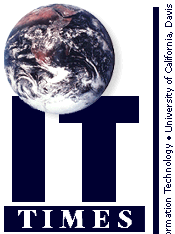
Odyssey '98:
Issues, Challenges, Rewards of Information Technology
by Matt MaloneIs information technology a potential that needs to be realized, or a problem that needs to be solved? Will distance learning revolutionize academia, or compromise its integrity in the name of a pseudo-education? And who's going to pay for all of this new technology anyway?
These are some of the questions that surround information technology on the UC Davis campus, and these are precisely the topics that this year's Odyssey events will explore. Odyssey, now in its third year, is the largest educational event of its kind on campus. Its goal: to act as a forum for exchanging ideas, exploring perspectives, and relating experiences in the use of information technology on campus. Odyssey '98 promises to be the best yet, bringing faculty, staff, and students together in a campuswide discussion about the issues, challenges, and rewards of information technology in education. This will be a three-day event, culminating in the computerized "take-over" of Freeborn Hall on Thursday, May 28, for a massive Technology Showcase.
Bringing the Campus Together
Even from its initial planning stages, the Odyssey team (of which I am happily a new member) has focused on bringing a variety of campus constituencies together, developing a sense of community across ranks and disciplines. The planning of Odyssey itself -- from the initial group that came up with the theme, to every marketer, promotional volunteer, and presenter -- involved people from all across campus. The various sponsors of the event reflect not only the fact that information technology will affect all segments of the campus, but that the campus community has a genuine interest in exploring the possibilities of information technology across and among our varied roles and duties. "
Student Issues on the Agenda
Use of information technology resources has never been more essential for students than it is now. Yet the student need for these resources brings up issues and challenges as well. Should students have to pay a fee for these services? Can the campus guarantee access to students from off campus, especially with a shrinking modem pool? Will the problem of overcrowding in campus labs ever be solved? With this in mind, student issues will be especially highlighted at this year's Odyssey, and not all of them will be strictly academic. Take, for example, the online ASUCD Book Exchange, which allows students to buy and sell used textbooks via the Web, as well as quickly and efficiently check whether a book they put up for sale has been sold. Moreover, the Internship and Career Center (ICC) has extensive career-related online offerings for students, alumni, and employers, which will also be demonstrated at Odyssey. "I think students need to be made more aware of the benefits of attending this fair," said the ICC's Joe Scuderi. "Odyssey can alert students to many special programs the campus offers. For example, our student-oriented presentation will make students aware that they can bid for career interviews online and even use the Web to learn when their interviews are scheduled." Hala Kurdi, an Odyssey volunteer, agreed. "As a student, I think a lot of the student body attending will benefit from seeing how the technology being presented has been implemented to better serve the student, faculty, and staff members around campus," Kurdi said.
Voicing Student Opinions
One issue that tends to unite faculty, staff, and students is that of distance learning: the potential to take courses that are almost solely Web-based for degree credit, or use the Web extensively within courses themselves. Many presenters at Odyssey promise to make this issue a prominent one. Aiming to "show that technology can improve the quality of instruction," Professor Harry Matthews will present "Virtual Lectures Free Students to Think Critically," demonstrating an application designed to facilitate Web use in instruction. Yet distance learning is far from a decided issue. With that in mind, the Joint Campus Committee on Information Technology (JCCIT) is sponsoring a panel focusing on the issues, challenges, and problems related to distance learning, not the least of which is the issue of who precisely is going to pay for it. ASUCD will voice student opinions not only at this panel discussion, but also on a second panel focusing on issues of off-campus access to the UC Davis network.Perhaps the greatest benefit of the Odyssey conference is the opportunity it provides for different campus units to inform themselves about the uses of information technology elsewhere on campus. "Odyssey is a great chance to see what other folks are doing and share ideas," said Dave Magliano of the Computer Assisted Learning Facility in the School of Veterinary Medicine. "It always amazes me how much can be going on down the hall or across the street without our knowing about it."
Faculty, staff, students, and administrators are all encouraged to join the Odyssey team in making these connections and exploring the technological future of university education.
Matt Malone is an undergraduate student majoring in political science and English. He served on the Odyssey '98 Advisory Group, which identified the theme, "Technology at UC Davis: Issues, Challenges, Rewards, " for this year's event.